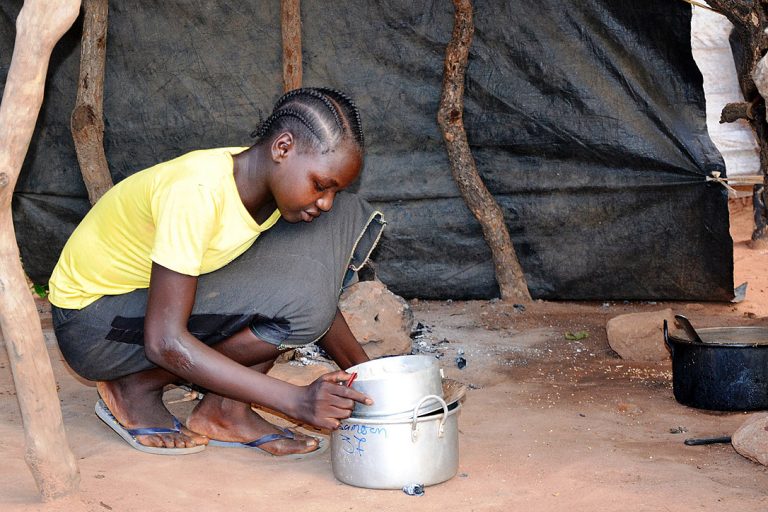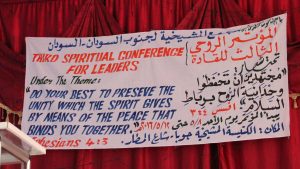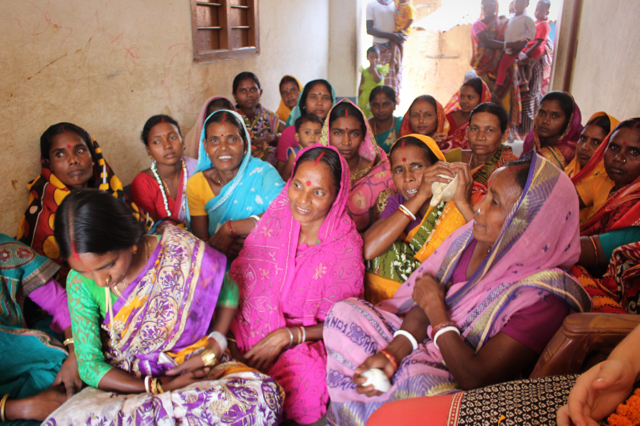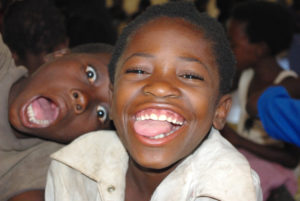To the advocates for South Sudan: Take heart! Do not be afraid
The following was adapted from a letter sent to encourage a large network of partners who work, pray and advocate alongside the Presbyterian Church of South Sudan (PCOSS). South Sudan is currently the epicenter of an emergency in Africa described by the United Nations as the largest humanitarian crisis since WWII.
April, 2017
I am sensing that many of us who advocate for the people of South Sudan are feeling discouraged. We all desperately seek an immediate end to conflict, to loss of life, and a way to provide humanitarian assistance for the people who suffer unimaginably. Millions displaced; uncounted killed; thousands starving… but they are not just numbers for us. They are family, friends and neighbours.
We feel the pain of the people and pray for them, yet nothing seems to improve. Our pleas seem to fall on deaf ears.
Sometimes we feel that we have done everything we can, yet nothing works. The truth is that the political, military and humanitarian situation in South Sudan is hard. People and governments disappoint and discourage us; the government of South Sudan seems to have become evil and the United States seems unwilling to intervene.

Photo credit: ABC, Martin Cuddihy (2016)
There is no value in pretending we don’t feel what we feel. We will never overcome discouragement by ignoring it or letting it paralyse our efforts. We always think that good will triumph, yet right now it seems more like failure.
When opposition seems to triumph, real conviction and genuine dedication are needed to stand against it. In my mind, I hear the clock ticking. Each tick equates to a baby starving, a woman being raped, a child being conscripted into the war, senseless killing of an aid worker… it is an ongoing nightmare. But we can’t just do nothing.
The following words of God were not just for Joshua, and that encourages me.
“Have I not commanded you? Be strong and courageous! Do not tremble or be dismayed, for the LORD your God is with you wherever you go.” (Joshua 1:9)
We must stop looking backwards at efforts that did not work; instead, we must shake off discouragement and keep trying. The price of failure is measured in lives lost and lives wasted. We cannot allow ourselves to falter or fail.
We won’t give up
At the same time, we, who work alongside you and consider you our friends and family in South Sudan, want you to know that we have not given up, and you must not either. We remember you, weep with you, and pray for you daily. We do not know when, but this horror will end. You will have a chance to rebuild your lives and establish a proper government that seeks to assist you rather than hold you back.
We know that people are divided and that even within ethnic groups there is disunity and distrust. But we also know that there is strength and unity in Christ.
South Sudan will be free
Just as there was a time when God called on Moses to lead the Jews out of Egypt, there will be a time when God provides freedom, justice, stability and peace for the people of South Sudan.
Time and time again, God tells us, “Do not be afraid.”
You are never alone. God walks ahead of you to guide you, beside you to be your friend, above and below you to support you, and behind you to encourage you. Call out to God for help in these troubled times.
Remember Jesus’ words at the conclusion of Matthew’s Gospel, “I am always with you, to the end of the age.”
Shake off discouragement. Don’t accept failure.
Instead, take heart – God’s success is inevitable.
– Bill Andress
Trinity Presbyterian South Sudan Ministry
South Carolina, USA








 The MCIF then organized hundreds of volunteers and Methodist youth to help sort and distribute goods in the days following the emergency, ensuring the relief supplies were quickly transferred to where they were needed most.
The MCIF then organized hundreds of volunteers and Methodist youth to help sort and distribute goods in the days following the emergency, ensuring the relief supplies were quickly transferred to where they were needed most. In front of Shanxi Christian Council office there is a park reconstructed on the top of the Tang dynasty city wall. The moderator Rev Wang pointed to the place below and said “This was the Western Gate”. In 635 the Prime Minister Fang travelled from the imperial court to this gate (today about 45 minutes driving) to receive the Patriarch from the Church of the East. The journey to the East reversed the direction of the Silk Road, and the missionary work was the result of two generations of Persian traders who lived in China. This story was recorded on the Nestorian Stele in Xian Stele Forrest Museum.
In front of Shanxi Christian Council office there is a park reconstructed on the top of the Tang dynasty city wall. The moderator Rev Wang pointed to the place below and said “This was the Western Gate”. In 635 the Prime Minister Fang travelled from the imperial court to this gate (today about 45 minutes driving) to receive the Patriarch from the Church of the East. The journey to the East reversed the direction of the Silk Road, and the missionary work was the result of two generations of Persian traders who lived in China. This story was recorded on the Nestorian Stele in Xian Stele Forrest Museum.
 Do you ever have days, even while you’re still in the middle of them, that you know will always stick with you? My first visit to a village in West Bengal, India, was one of those days.
Do you ever have days, even while you’re still in the middle of them, that you know will always stick with you? My first visit to a village in West Bengal, India, was one of those days. Answers were honest and direct. Life is hard, but this project is making a difference. Our children at the study centre are working hard and their grades are improving – they’re no longer at risk of dropping out of school and we’re not scared for them. This woman here (she is pointed out to us) was supported to apply for and access the old age pension, so she doesn’t have to work all day long in the forest gathering leaves anymore. Our community worker, from our village (he stands up), helped us get government grants to build houses and toilets and access to water sources for irrigation. The government health worker is visiting and we know how to stay healthy, how to keep our children well. Our women’s self-help groups (they raise their hands) have saved money this year, and have plans to start their own business.
Answers were honest and direct. Life is hard, but this project is making a difference. Our children at the study centre are working hard and their grades are improving – they’re no longer at risk of dropping out of school and we’re not scared for them. This woman here (she is pointed out to us) was supported to apply for and access the old age pension, so she doesn’t have to work all day long in the forest gathering leaves anymore. Our community worker, from our village (he stands up), helped us get government grants to build houses and toilets and access to water sources for irrigation. The government health worker is visiting and we know how to stay healthy, how to keep our children well. Our women’s self-help groups (they raise their hands) have saved money this year, and have plans to start their own business.
 “End of Life Care” is a special skill to prepare the elderly for life’s good ending. At the training, we realised that UnitingCare has a reservoir of knowledge gained over half a century. Derived from ministry of the laity, the UCA agency has become the largest social service provider in Australia, serving 1 in 8 Australians. Here at Shandong, they put a powerful idea into people’s minds. Dying is not just about death, but also life. To care for the dying is about celebrating life. All skills are built on this ethic and hope.
“End of Life Care” is a special skill to prepare the elderly for life’s good ending. At the training, we realised that UnitingCare has a reservoir of knowledge gained over half a century. Derived from ministry of the laity, the UCA agency has become the largest social service provider in Australia, serving 1 in 8 Australians. Here at Shandong, they put a powerful idea into people’s minds. Dying is not just about death, but also life. To care for the dying is about celebrating life. All skills are built on this ethic and hope.

 Thanks for sticking with us. We hope this honest answer to your question encourages you not to feel guilty about your giving, and explains why we continue to ask. Please know that we take great care with your gifts and appreciate your generosity. Most of all, the people to whom you give appreciate it more than we’ll ever know.
Thanks for sticking with us. We hope this honest answer to your question encourages you not to feel guilty about your giving, and explains why we continue to ask. Please know that we take great care with your gifts and appreciate your generosity. Most of all, the people to whom you give appreciate it more than we’ll ever know.